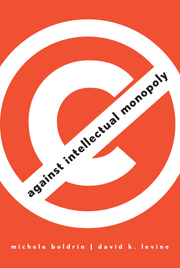Book contents
- Frontmatter
- Contents
- Acknowledgments
- 1 Introduction
- 2 Creation under Competition
- 3 Innovation under Competition
- 4 The Evil of Intellectual Monopoly
- 5 The Devil in Disney
- 6 How Competition Works
- 7 Defenses of Intellectual Monopoly
- 8 Does Intellectual Monopoly Increase Innovation?
- 9 The Pharmaceutical Industry
- 10 The Bad, the Good, and the Ugly
- References
- Index
- Plate Section
5 - The Devil in Disney
Published online by Cambridge University Press: 30 July 2009
- Frontmatter
- Contents
- Acknowledgments
- 1 Introduction
- 2 Creation under Competition
- 3 Innovation under Competition
- 4 The Evil of Intellectual Monopoly
- 5 The Devil in Disney
- 6 How Competition Works
- 7 Defenses of Intellectual Monopoly
- 8 Does Intellectual Monopoly Increase Innovation?
- 9 The Pharmaceutical Industry
- 10 The Bad, the Good, and the Ugly
- References
- Index
- Plate Section
Summary
Patents threaten our economic prosperity, we have argued, because of the many evils of monopoly and especially because of the evil we call IP-inefficiency. Copyright seems less threatening. Enriching without reason a few actors, singers, or book writers is not as bad as letting millions of people die because some monopolist is not producing enough anti-AIDS pills. The copyright industry itself is economically insignificant. The entire motion picture and recording industry has fewer employees than the IBM Corporation. If we consider all employment in copyright-connected industries, we find that industries such as fabricated metal production and transportation equipment manufacturing employ substantially more workers – the “copyright” industry is about on par with the furniture industry in terms of economic importance.
In important respects, copyright law seems less threatening than patents. Although the length of copyright is excessively long, the scope of coverage historically has been narrow: in principle, only the expression of ideas is covered, not the ideas themselves. Again, in principle, this is less harmful to the downstream production of new ideas and the expression of ideas than is the much broader protection offered by patents. Certainly, in practice, if I want to write a Harry Potter–like book about child sorcerers I am free to do so. On the other hand, over time, copyright has grown in scope: I am not free to write a sequel in the Harry Potter series. In some respects, copyright increases competition, encouraging the production of similar but different works.
- Type
- Chapter
- Information
- Against Intellectual Monopoly , pp. 97 - 122Publisher: Cambridge University PressPrint publication year: 2008

